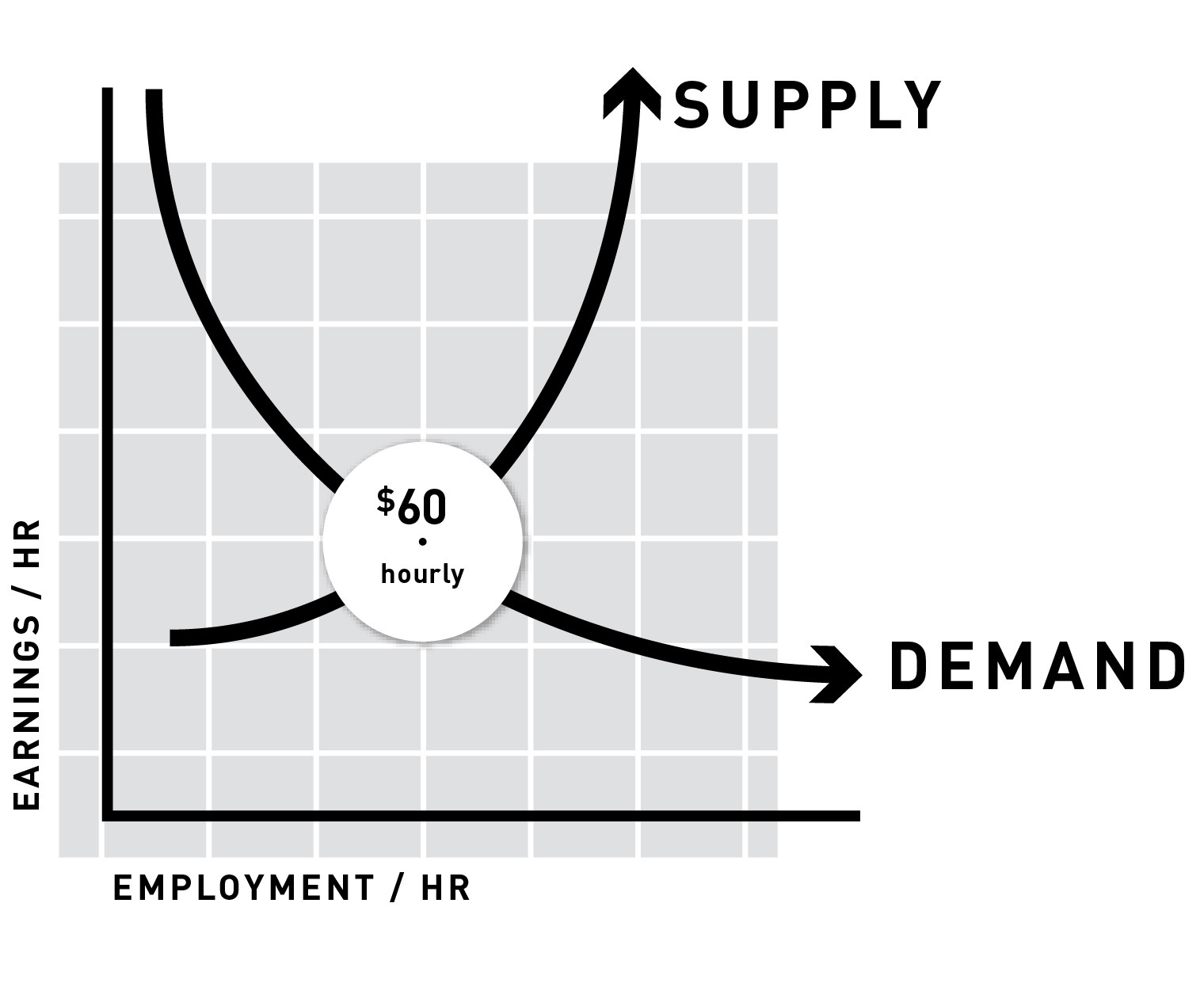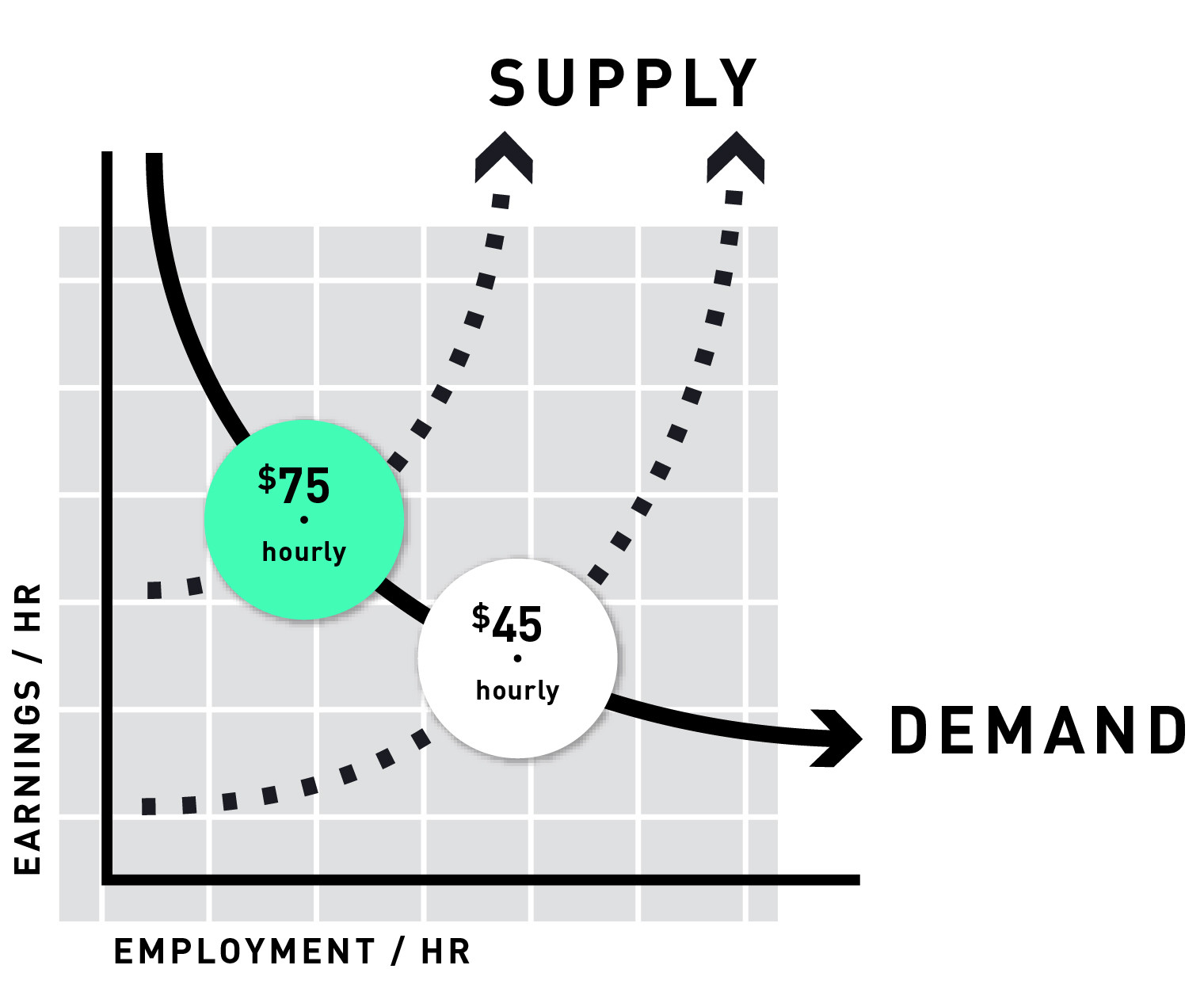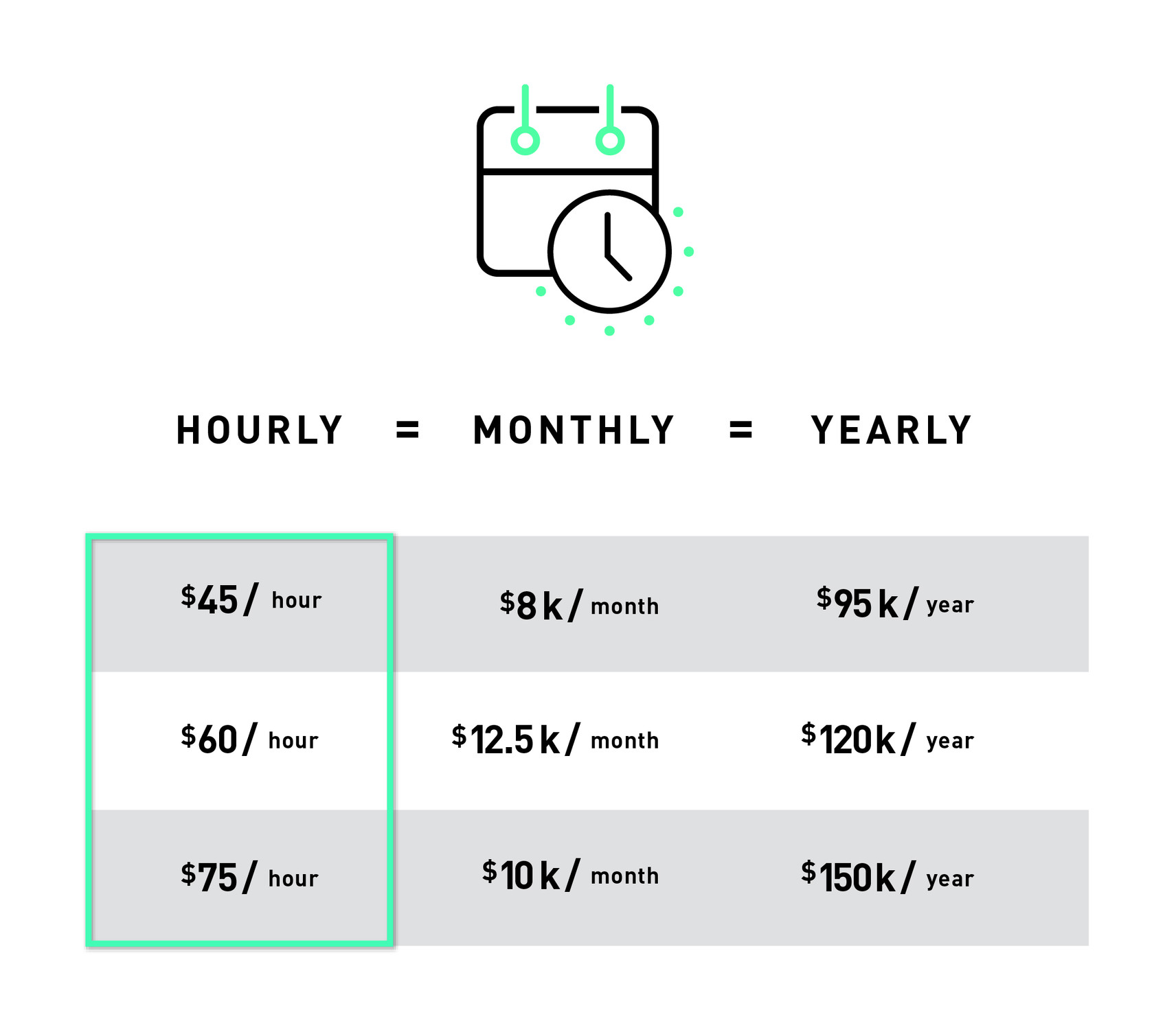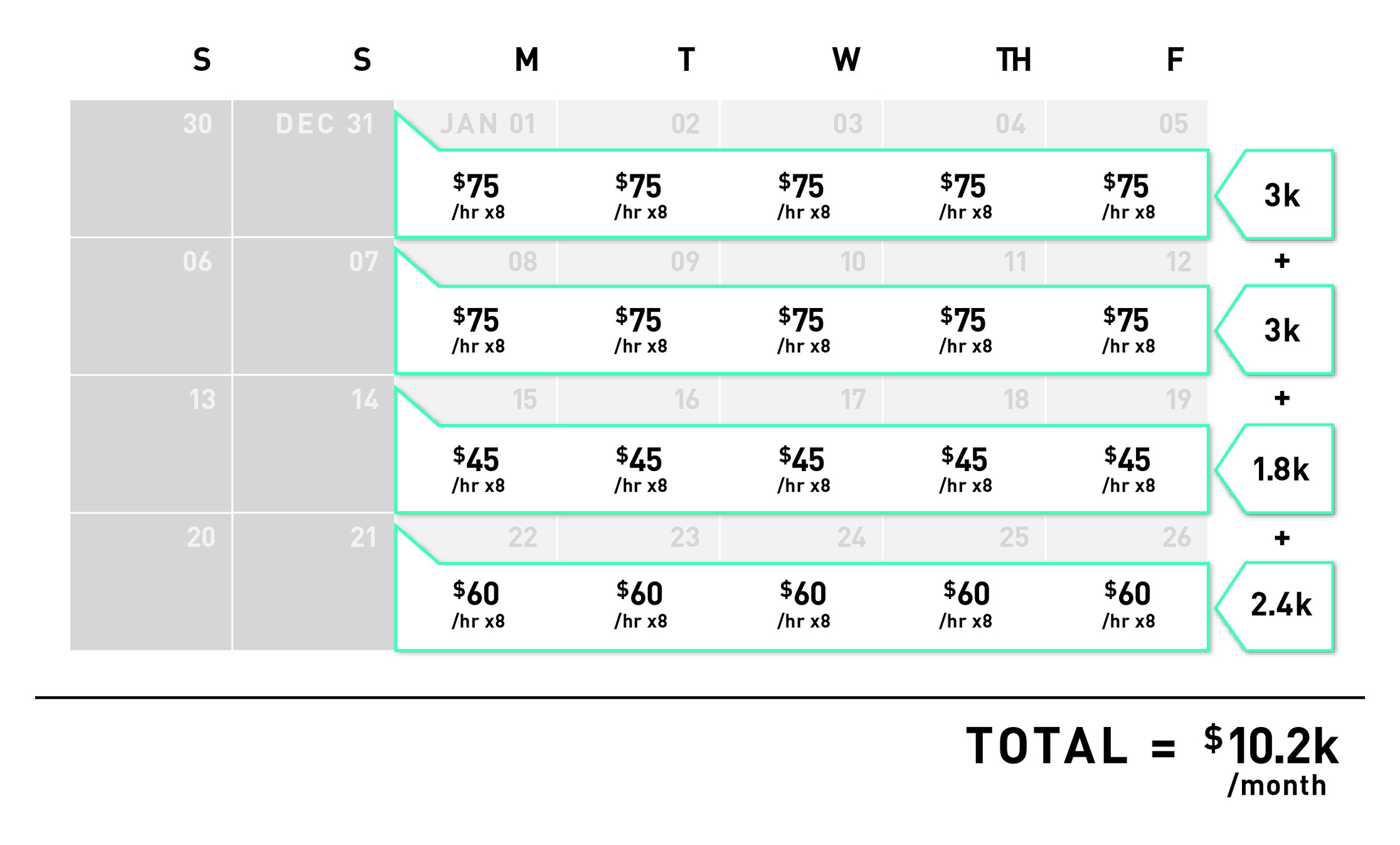Compensation is a point of contention in many employer/employee relationships. How do we price ourselves so that we stay competitive and secure in our compensation? Vice President of Artisan Talent, Haris Silic, has some practical tips and formulas for helping you figure out what to charge when it comes to pay rates.
I’d like to bring some objective and constructive light to the topic of pay ranges and hopefully help you negotiate a better price for yourself next time you are in a salary or contract negotiation. First, I will explain the mechanism that determines the price someone will pay for your work, and then I will present a process you can use to set your own rates for the work you will provide.
Mechanism That Determines Price
One major misconception is that your rate or salary should be a constant. ![]()
For instance, if you got paid $75/hr on your last gig or made $120K last year, then that will be your price. I would argue, however, that your price should be a range.
Basic economic theory teaches us that the amount (price) someone is willing to pay for services provided will depend on economic drivers of supply and demand. Therefore your price should not be a constant, but rather a construct that adapts to a range of factors.
 The rate you get paid is determined by the person/company that pays you. You may attach any price tag to your service. However, the rate is ultimately determined by market forces such as supply, demand, and current industry rates.
The rate you get paid is determined by the person/company that pays you. You may attach any price tag to your service. However, the rate is ultimately determined by market forces such as supply, demand, and current industry rates.Let’s use real estate as an example: anyone can list their house at any price they would like, however, the final price of the house will be determined by the buyer. If the house is overpriced, then it will sit on the market longer, and if it is underpriced, there will be a bidding war.
What Changes Your Price?
Your price is adaptable and will likely need to change based on your expertise, specialty, reputation, and quality of work.

Quality of work is subjective and will be dependent on whoever is trying to hire you. If they deem your work of higher quality than the rest of the talent pool, they will pay a higher price for you. Expertise and reputation is validated by your peers — if you have people vouching for you, you will always have more of an opportunity to earn the rates that you want.
If you are a specialist in a specific area and there is someone who needs that specialty, then they will be much more willing to pay a premium price for your service. We can continue the real estate example: houses with newer finishes, in nicer neighborhoods, and with better proximity to business centers are priced higher. If you know people in the neighborhood who can vouch for the area, you will be much more likely to pay the premium for the house.
How Do I Determine My Rate?
/OLD%20Social_Imagery/What's%20Your%20Price%20Haris.jpg?width=744&height=400&name=What's%20Your%20Price%20Haris.jpg)
Trying to adapt your salary rate to freelance hourly dollars? Or want to convert your hourly pay rate to an equal salary? Here's how:
Let’s say you are an incredible branding superstar Designer with a sick resume and an even sicker entertainment portfolio. You earned $75k as a Senior Designer and now that you are a Design Director, you earn between $105k and $125k. You just learned that you are being laid off and want to try out the freelance world, but don’t know how to price yourself. (The following logic applies to anyone trying to set their salary range.)
Setting a Salary Range
First, I suggest you start thinking of a number that you feel comfortable with. Let’s say $60/hr. In your heart, you feel that if you get paid $60/hr, you are not undervaluing your worth. Also, this rate aligns with the annual income from your previous job.
Now you should think of your bottom rate and also your high-end rate. Maybe $45/hr is something you think is the absolute minimum that you have to charge and $75/hr is your high-end rate. You also know that in a month, you need to make around $10,000 in gross income (average rate of $60/hr). Below are some scenarios that will help you understand how to set your rates in these specific situations.

Price Adaptability in Action
Scenario 1: Long-Term Contracts
/0.jpg?width=2060&height=485&name=0.jpg)
You are interviewing for a long-term contract (12 months or longer), and you will be doing work similar to your previous job. You should use your annual salary to determine the hourly range that would equate to this salary.
If you were making $120K, your rate should be around $60/hr.
Scenario 2: Specialty/Expertise Projects
/0-1.jpg?width=2060&height=485&name=0-1.jpg)
You are meeting a potential client who needs you to work on a very specific project. They have contacted you because of your branding specialty and because most of your portfolio is in the entertainment space. Since they will be using you for a short period and you will be applying your specialty knowledge, you should charge them a higher end of your range — around $75/hr. Usually, these projects are 2-3 days long. You will need to book 15 days of work to get to $10,000.
Note: These projects tend to be scarcer and harder to land. You will need to hustle in order to line up 4-5 of these projects each month to get the income you need.
Scenario 3: Exciting Projects
/0-2.jpg?width=2060&height=485&name=0-2.jpg)
One of your friends is working with a startup, and they need help creating a brand. They have no idea what a logo is, but you love their mission. Their budget is nonexistent. So with them, you would use your lower-end rate — around $45/hr.
There are always going to be plenty of these projects so you can mix them up with some higher-end projects described above. For instance, you can take on two high-end projects a month and fill the rest of the time with these short-term, exciting projects.
For example:

Scenario 4: Lowering Your Rates
/Article-Images_HIGH-RES-04%20(1).jpg?width=1815&height=1120&name=Article-Images_HIGH-RES-04%20(1).jpg)
Your mailbox is full of bills and your credit cards are almost maxed out. You have been sticking to your guns and only taking calls for jobs that are at your level and at your range. However, no one has booked you, yet. At this point, the demand is obviously not there for someone at your level or rate, so you may need to rethink your price for the time being. In this case, I would lower my rate to $45-$50 pay some bills, and take some short-term contracts. Let’s say there is a client that wants to hire you for three months and you don’t have any other prospects — making $45-$50 is better than making $0.
Note: If you accept a project or a job at a rate lower than your standard or high-end rate, your attitude and quality of work should not suffer. If it does, your expertise and reputation will be in jeopardy.
In Conclusion
Most people are highly emotional when it comes to their rates. After all, rates are a monetary valuation of the service you are providing.
However, if we take a step back and bring some logic to the pricing system, we may be able to negotiate better for ourselves.

Haris Silic is the Vice President of Artisan Talent. He holds a graduate degree from Pratt Institute's Design Management program and is passionate about design. The fusion of business and design brought him to recruiting, where he enjoys helping clients discover incredible design talent and molding talented creatives into the strongest candidates they can be.
/What's%20Your%20Price%20Pay%20Rate.jpg?width=380&name=What's%20Your%20Price%20Pay%20Rate.jpg)



